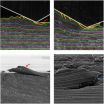(Press-News.org) TORONTO, ON (23 JULY 2014) – A team of astronomers has made the most precise measurements yet of water vapour in the atmospheres of Jupiter-like planets beyond our Solar System and found them to be much drier worlds than expected.
The team, including Dr. Nicolas Crouzet of the Dunlap Institute for Astronomy & Astrophysics, University of Toronto, has found that the abundance of atmospheric water vapour is between ten and a thousand times less than what models predict.
"The low water vapour levels are surprising," says Crouzet. "Our models predict a much higher abundance of water vapour, and so these results challenge our current understanding of planet formation. And they raise questions about our ability to identify water in an Earth-like exoplanet."
According to the core accretion theory of planet formation, planetary systems form from a huge disk of hydrogen gas and dust around a star. Over a period of a million years or more, the dust particles stick together, forming larger and larger grains. Eventually, the grains collect to form planetesimals which eventually coalesce into a planet. At the same time, the gravity of the planet attracts an atmosphere of gas from the disk.
The theory predicts that a planet's most abundant element will be oxygen, which would take the form of water vapour in the atmosphere. The very low levels of water vapour discovered by the researchers raise questions about our understanding of the chemical processes involved in planet formation.
The results also give astronomers an idea of what they face in searching for an exoplanet capable of supporting life.
"These very hot planets with large atmospheres, orbiting nearby stars, are the best possible candidates for measuring water levels," says Dr. Nikku Madhusudhan of the Institute of Astronomy at the University of Cambridge. "And yet the levels we found were much lower than expected. This shows just how challenging it could be to detect water on Earth-like exoplanets in our search for potential life elsewhere."
Madhusudhan is lead author on the paper describing these results, published 24 July 2014 in the Astrophysical Journal Letters. In addition to Madhusudhan and Crouzet, collaborators included Dr. Drake Deming from the University of Maryland, and Dr. Peter McCullough from the Space Telescope Science Institute and Johns Hopkins University.
The team analyzed near-infrared spectra, obtained using the Hubble Space Telescope, of three exoplanets between 60 and 900 light years away, identified as HD 189733b, HD 209458b, and WASP-12b. The exoplanets belong to a class of planets known as "hot Jupiters" and have average temperatures between 900 and 2200° C.
The Hubble Space Telescope did not directly resolve the planets; instead, it collected light from both the parent star as well as light that passed through the planet's atmosphere as the planet passed in front of the star. "Subtracting" the light of the star from the total light collected left the light that passed through the planet's atmosphere. Spectroscopic analysis of this light allowed the astronomers to measure the presence of water vapour.
INFORMATION:
The work was supported by NASA through a grant from the Space Telescope Science Institute, which is operated by the Association of Universities for Research in Astronomy, Inc.
FULL PAPER, RELEASE AND IMAGES FOR DOWNLOAD BY MEDIA:
http://dunlap.utoronto.ca/for-the-media/downloads
Password: HD209458b
CONTACT INFORMATION:
Dr. Nicolas Crouzet
Dunlap Fellow
Dunlap Institute for Astronomy & Astrophysics
University of Toronto
e: crouzet@dunlap.utoronto.ca
p: 416-946-5432
* Please note that Dr. Crouzet is fluent in French.
Chris Sasaki
Communications Coordinator
Dunlap Institute for Astronomy & Astrophysics
University of Toronto
e: csasaki@dunlap.utoronto.ca
p: 416-978-6613
To interview Dr. Madhususdhan, contact:
Sarah Collins
Office of Communications
University of Cambridge
e: sarah.collins@admin.cam.ac.uk
Astronomers come up dry in search for water on exoplanets
Astronomers surprised by low H20 abundances in hot Jupiter atmospheres
2014-07-24
ELSE PRESS RELEASES FROM THIS DATE:
One route to malaria drug resistance found
2014-07-24
Researchers have uncovered a way the malaria parasite becomes resistant to an investigational drug. The discovery, at Washington University School of Medicine in St. Louis, also is relevant for other infectious diseases including bacterial infections and tuberculosis.
The study appears July 24 in Nature Communications.
Many organisms, including the parasite that causes malaria, make a class of molecules called isoprenoids, which play multiple roles in keeping organisms healthy, whether plants, animals or bacteria. In malaria, the investigational drug fosmidomycin blocks ...
New methods of detecting Salmonella in pork meat processing
2014-07-24
Traditional methods of characterising and detecting bacteria are often slow and time-consuming. Therefore, development of new methods of characterising and detecting illness-causing microorganisms is very important for improving food safety.
Trine Hansen, PhD student at the National Food Institute, has studied new methods of characterising Salmonella in pork meat processing and detecting unknown bacteria in water, feed and food samples.
The research project has given a better understanding of which factors in pork meat processing may contribute to the development of ...
Chemist develops X-ray vision for quality assurance
2014-07-24
It is seldom sufficient to read the declaration of contents if you need to know precisely what substances a product contains. In fact, to do this you need to be a highly skilled chemist or to have genuine X-ray vision so that you can look directly into the molecular structure of the various substances. Christian Grundahl Frankær, a Postdoc at DTU Chemical Engineering, is almost both, as he has developed a method that allows him to use X-rays to look deep into biological samples.
The 'Fingerprints' of a Substance
The technique is called 'powder diffraction' and involves ...
Unleashing the power of quantum dot triplets
2014-07-24
Quantum computers have yet to materialise. Yet, scientists are making progress in devising suitable means of making such computers faster. One such approach relies on quantum dots—a kind of artificial atom, easily controlled by applying an electric field. A new study demonstrates that changing the coupling of three coherently coupled quantum dots (TQDs) with electrical impulses can help better control them. This has implications, for example, should TQDs be used as quantum information units, which would produce faster quantum computers due to the fact that they would be ...
Tempting people to move for work takes more than dollars
2014-07-24
Sufficient financial inducements are one way of encouraging people to move to regional Australia for jobs, but other factors also play a part, according to a new report.
Moving workers from a region with high unemployment to a region with many job vacancies is an important aspect of labour markets. The Commission of Audit recently advised the government to "force" long-term unemployed people who are single and between the ages of 22 and 30 to move to areas of higher employment if they have been on the dole for 12 months.
Researchers from Monash and Deakin Universities ...
Study reveals medical students believe health policy education is improving
2014-07-24
Philadelphia – Students graduating from U.S. medical schools in 2012 feel they've received a better education in health policy issues than graduates surveyed in 2008, according to a multi-center study led by the Perelman School of Medicine at the University of Pennsylvania, and published online this month in Academic Medicine. The study applied a new framework for teaching and evaluating perceptions of training in health policy, first proposed by the authors in a 2011 perspective published in the New England Journal of Medicine.
"Our prior work found that for nearly a ...
Discovery is key to metal wear in sliding parts
2014-07-24
WEST LAFAYETTE, Ind. – Researchers have discovered a previously unknown mechanism for wear in metals: a swirling, fluid-like microscopic behavior in a solid piece of metal sliding over another.
The findings could be used to improve the durability of metal parts in numerous applications.
"Wear is a major cause of failure in engineering applications," said Srinivasan Chandrasekar, a Purdue University professor of industrial engineering and materials engineering. "However, our findings have implications beyond wear itself, extending to manufacturing and materials processing."
The ...
Highest-precision measurement of water in planet outside the solar system
2014-07-24
A team of astronomers using NASA's Hubble Space Telescope have gone looking for water vapour in the atmospheres of three planets orbiting stars similar to the Sun – and have come up nearly dry.
The three planets, HD 189733b, HD 209458b, and WASP-12b, are between 60 and 900 light-years away, and are all gas giants known as 'hot Jupiters.' These worlds are so hot, with temperatures between 900 to 2200 degrees Celsius, that they are ideal candidates for detecting water vapour in their atmospheres.
However, the three planets have only one-tenth to one-thousandth the ...
Wives with more education than their husbands no longer at increased risk of divorce
2014-07-24
WASHINGTON, DC -- For decades, couples in which a wife had more education than her husband faced a higher risk of divorce than those in which a husband had more education, but a new study finds this is no longer the case.
"We also found that couples in which both individuals have equal levels of education are now less likely to divorce than those in which husbands have more education than their wives," said Christine R. Schwartz, lead author of the study and an associate professor of sociology at the University of Wisconsin-Madison. "These trends are consistent with ...
Warning: Birthdays can be bad for your health
2014-07-24
New research has found that birthday-related drinking is associated with upsurges in hospital admissions among young people. This study of drinking behaviour in Ontario, Canada is published online today in the scientific journal Addiction.
Researchers, led by University of Northern British Columbia Associate Professor of Psychiatry Dr. Russ Callaghan, analysed records from all hospital admissions in Ontario over a five-year period (2002-07) involving people aged 12 to 30 years. They discovered that during the week in which Ontarians turned 19 – the legal drinking age ...
LAST 30 PRESS RELEASES:
Enzymes work as Maxwell's demon by using memory stored as motion
Methane’s missing emissions: The underestimated impact of small sources
Beating cancer by eating cancer
How sleep disruption impairs social memory: Oxytocin circuits reveal mechanisms and therapeutic opportunities
Natural compound from pomegranate leaves disrupts disease-causing amyloid
A depression treatment that once took eight weeks may work just as well in one
New study calls for personalized, tiered approach to postpartum care
The hidden breath of cities: Why we need to look closer at public fountains
Rewetting peatlands could unlock more effective carbon removal using biochar
Microplastics discovered in prostate tumors
ACES marks 150 years of the Morrow Plots, our nation's oldest research field
Physicists open door to future, hyper-efficient ‘orbitronic’ devices
$80 million supports research into exceptional longevity
Why the planet doesn’t dry out together: scientists solve a global climate puzzle
Global greening: The Earth’s green wave is shifting
You don't need to be very altruistic to stop an epidemic
Signs on Stone Age objects: Precursor to written language dates back 40,000 years
MIT study reveals climatic fingerprints of wildfires and volcanic eruptions
A shift from the sandlot to the travel team for youth sports
Hair-width LEDs could replace lasers
The hidden infections that refuse to go away: how household practices can stop deadly diseases
Ochsner MD Anderson uses groundbreaking TIL therapy to treat advanced melanoma in adults
A heatshield for ‘never-wet’ surfaces: Rice engineering team repels even near-boiling water with low-cost, scalable coating
Skills from being a birder may change—and benefit—your brain
Waterloo researchers turning plastic waste into vinegar
Measuring the expansion of the universe with cosmic fireworks
How horses whinny: Whistling while singing
US newborn hepatitis B virus vaccination rates
When influencers raise a glass, young viewers want to join them
Exposure to alcohol-related social media content and desire to drink among young adults
[Press-News.org] Astronomers come up dry in search for water on exoplanetsAstronomers surprised by low H20 abundances in hot Jupiter atmospheres



